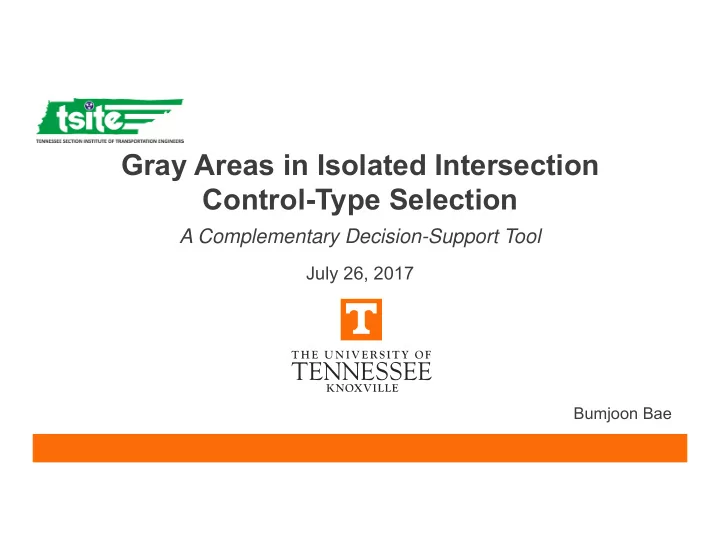

Gray Areas in Isolated Intersection Control-Type Selection A Complementary Decision-Support Tool July 26, 2017 Bumjoon Bae
Overview • About me • Motivation • Scenario design for analysis • Research results • Conclusions
About me • BS in Transportation System Engineering, Ajou University, South Korea • MS in City Planning, Seoul National University, South Korea • Worked as a Traffic Engineer/Traffic Signal Operator in Seoul, South Korea • PhD Candidate in Civil Engineering/MS Candidate in Statistics, University of Tennessee
Motivation • Previous works for intersection control type comparison
Motivation (Cont’d) • How to deal with uncertainties in a modeling process? • Control Delay (HCM 2010) � �.�� ��� � ⁄ ���� �� � 1� � � Signalized Intersections: � � � 900� �� � 1� � - ⁄ �� ��� �,� � � � �� � �,��� �� � �,��� � � � � ��,� ��,� Two Way Stop Control (TWSC): � � � �,� � 900� � �,� � 1 � � �,� � 1 � � - ���� 5 � � � � � 1 � � All Was Stop Control (AWSC): � � � � � 900� �� � 1� � ���� � 5 - �,��� � �� �,��� � � 1 � � Roundabout: � � � 900� �� � 1� � � � 5 � min�� �� , 1� - � ����
Motivation (Cont’d) • Does a human driver perceive one or two seconds of delay difference at an intersection? • “User-perceived service quality ratings do not correspond to the level of service evaluated using the HCM methods” - Lee at el. (2007) • “… weak linear association between user perceptions (LOS ratings) and capacities (or volume-to-capacity ratios).” - Chen at el. (2009) • “Trip purpose, socioeconomic-, road-related characteristics, and weather conditions are all significant influential factors … ” - Jou at el. (2013)
Scenario design for analysis • Control delay comparison for the intersection control types: • TWSC, AWSC, Signal Control, and Roundabout • Average control delay models of HCM 2010 (FHWA) • Total 21,525 scenarios were analyzed in terms of the following factors. • 4-legged single-lane intersection • Major and minor streets volume of 0-2,000 veh/h in 50 veh/h increments • Left-turn volume percentage of 0-20%
Analysis results • 20% Left Turn Volume
Analysis results • 20% Left Turn Volume
Analysis results • 20% Left Turn Volume MUTCD Signal Warrant 1 Warrant 3 Warrant 2
Analysis results • No signal optimization
Analysis results • Signal optimization (Cycle length and splits)
Conclusions • The gray area concept can help engineers and practitioners make an engineering judgement. • The gray areas can be used for a benefit-costs analysis for converting intersection control type from one to another in the future. • This conceptual tool can be applied many other decision making situations based on quantitative metrics.
Recommend
More recommend